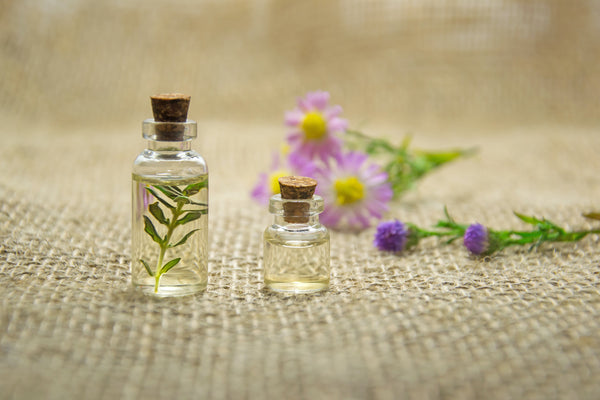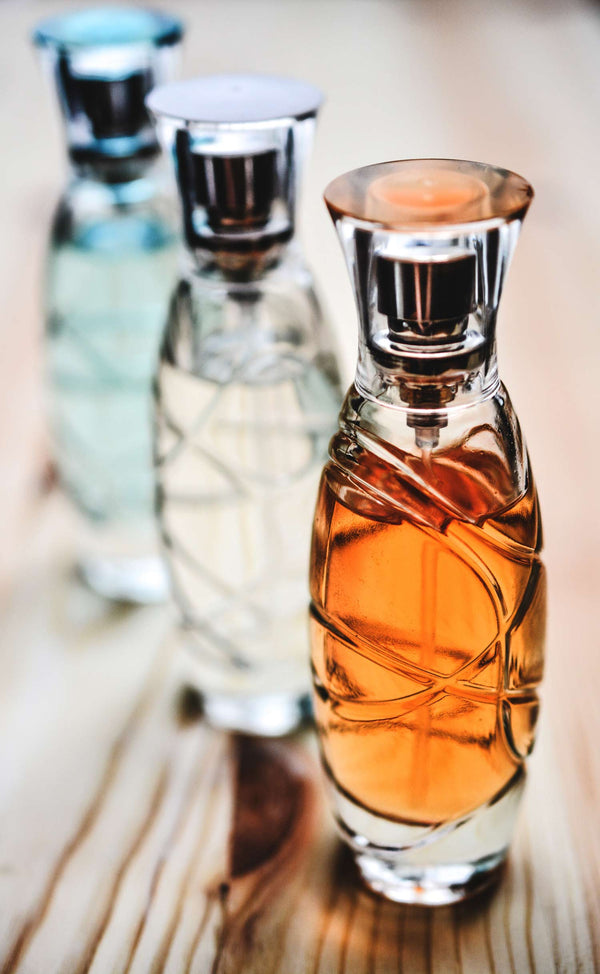
Best Essential Oils and Synthetic Fragrances for Your DIY Perfume
When creating a DIY fragrance, you have two options to scent your formula – essential oils and fragrance notes.
Neither of these choices is inherently “better” than the other. As long as you use high-quality ingredients, a well-rounded scent palette can include both.
What’s the difference between essential oils and fragrance notes?
In simple terms, essential oils are derived from plants and fragrance notes are developed by people in a lab.
Just because fragrance oils are synthetic does not necessarily make them inferior to their natural cousins. Both natural and synthetic fragrances have benefits and drawbacks, and both have their place in your perfumer’s cabinet.
What are essential oils?
Essential oils are the “essence” of a plant. They are extracted from roots, bark, leaves, flowers, or other plant parts, then distilled into a concentrated liquid.
Essential oils have been used for centuries in perfume making and aromatherapy.
Many claim physical or psychological benefits like reduced stress or increased mental clarity. Because they are sourced from crops, essential oils are typically more expensive than fragrance notes and their price can be impacted by a good or bad harvest year.
What are fragrance notes?
Fragrance notes – also known in the perfume industry as "bases" – blend natural oils with synthetic compounds.
Many staple notes in DIY perfume would not be possible without synthetic fragrances – for example, no essential oils smell like apples, chocolate, or fresh-cut grass.
Because fragrance notes are created in a controlled environment, they are often less costly than essential oils, and their prices are more stable. They may also claim a lower environmental impact.
Benefits of Using Essential Oils in Perfume
Aromatherapy
Many people select essential oils for their homemade fragrances because of their aromatherapy benefits.
For example, multiple studies have concluded that smelling lavender oil promotes relaxation and sleep. A few small studies have found the smell of peppermint and chamomile oils can provide relief from chronic headaches.
When you apply essential oil to the skin, as in a perfume, you take in more than the fragrance.
You also absorb some of the plant compounds through your skin. It’s important to understand the effect essential oils have on the body aside from their aroma.
For example, citrus oils can increase the risk of sunburn, so you should be careful to apply sunscreen if you use orange oil in your DIY fragrance.
Single-ingredient Fragrance
One of the downsides of fragrance notes is the number of ingredients it may take to produce a scent.
In contrast, essential oils come from a single source – your rose oil was distilled from rose petals, your basil oil from basil leaves.
High-quality oils are also sourced from a single location, which you should be able to easily find in the seller’s description.
| Type | Family | Note | Flashpoint | Botanical Name | Plant Part | Origin | Documents |
| Essential Oil | Verdant | Heart | 167° F | ocimum basilicum | Leaves | USA | MSDS, IFRA |
Shelf Life
Most essential oils last longer in storage than their synthetic counterparts. The shelf life of an essential oil varies based on the oil and how it’s stored.
To maximize your oil’s shelf life, store it in dark bottles in a cool, dark place. Signs an essential oil has expired include changed or faded aroma, changes in color, a thickened consistency, and a murky or foggy appearance.
The Environmental Cost of Essential Oils
As essential oils have soared in popularity, their production has taken a toll on the environment. It requires a tremendous amount of plant material to make a bottle of essential oil.
Producing one ounce of rose oil requires about 48,000 individual roses. An ounce of orange oil takes almost 300 oranges.
Rising demand for these oils has led to large-scale industrial farming that negatively impacts soil and local ecosystems.
Some oil-producing plants are wild harvested instead of farmed, which creates its own problems.
For example, sandalwood trees are cut down to harvest their oil, while the bark of frankincense trees is slashed to drain the sap, leaving trees vulnerable to infection.
As disheartening as this is, it does not mean you should give up on using natural fragrances in your perfume.
You can protect the environment by buying your oils from responsible producers that use sustainable farming and distilling practices.
Here are some signs that indicate your oils are responsibly produced:
- MSDS documents are available from the seller
- Bottle has the plant’s botanical name on the label
- Seller displays the plant part and extraction method used to obtain the oil
- Oil has a single point of origin
- Seller works with reputable distributors
- Oil is marked as 100% pure essential oil
Benefits of Using Fragrance Notes in DIY Perfume and Cologne
There are three notable reasons that synthetic fragrance notes are a mainstay in perfumery.
- Wider selection of aromas
- Longer lasting fragrances
- Smaller environmental footprint
Wider Selection of Aromas
For the DIY perfumer, one of the best reasons to use fragrance notes is the vast library of scents they make available – from fruity notes like watermelon and strawberry to foodie notes like coconut and coffee to complex scents like fresh water or leather.
Many of the scent notes people love simply can’t be distilled into a natural essential oil.
Some plants, like honeysuckle and jasmine, are too delicate to withstand the distillation process. Others, like cinnamon, contain compounds in their oils that can lead to skin irritation. Fragrance notes offer a safe, sustainable way to incorporate those scents into your homemade fragrance.
Longer Lasting Fragrances
Fragrance notes often last longer in a perfume than their natural cousins, so you won’t have to reapply your perfume as frequently.
Smaller Environmental Footprint
Synthetic fragrance notes are human-made in a controlled environment, so they don’t have the environmental impact of essential oils. There is no risk of soil exhaustion or pesticide use.
Choosing a synthetic version of woodsy fragrances like sandalwood and frankincense protects vulnerable tree populations around the world.
This method of production also makes it easier for manufacturers to produce consistent results and maintain a stable price point.
Are synthetic fragrance notes health hazards?
Synthetic fragrances have attracted a bad reputation that’s not entirely unearned. It’s common for lower-grade fragrances to include petroleum-based chemicals, which have been linked to a host of health risks.
Phthalates are one of the prime villains in synthetic fragrances. These chemical compounds are found in many everyday items – like cosmetics, detergents, and building materials.
Manufacturers of premium fragrance notes avoid including these chemicals in their formulas.
All of Vetiver’s fragrance notes are premium grade and phthalate free.
Here’s how to be confident your synthetic fragrance oils are clean and safe:
- MSDS documents are available from the seller
- Seller works with reputable manufacturers
- Notes are guaranteed free from phthalates
Essential Oils vs. Fragrance Notes
Both essential oils and fragrance notes have their pros and cons. Here’s how they compare side by side.
|
Essential Oils Origin: Natural Key advantage: Aromatherapy benefits Shelf life: 2 to 15 years Cost: Often more expensive Watch out for: Environmental sustainability |
Fragrance Notes Origin: Synthetic Key advantage: Can mimic scents not found in essential oils Shelf life: 1 to 2 years Cost: Often less expensive Watch out for: Phthalates and petrochemicals |
There’s no need to choose between using essential oils and fragrance notes in your scent palette. In both cases, you should do your research to identify potential allergens or unintended side effects.
And in both cases, source your scents from a reputable seller who stands behind their products. Learn more about making your custom perfume and colognes by downloading our free Beginner’s Guide to Perfumery.

